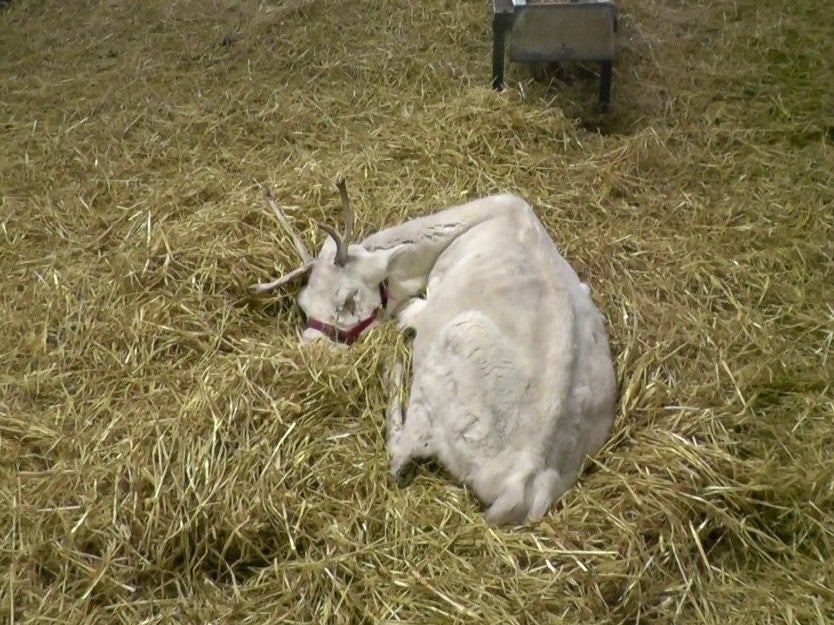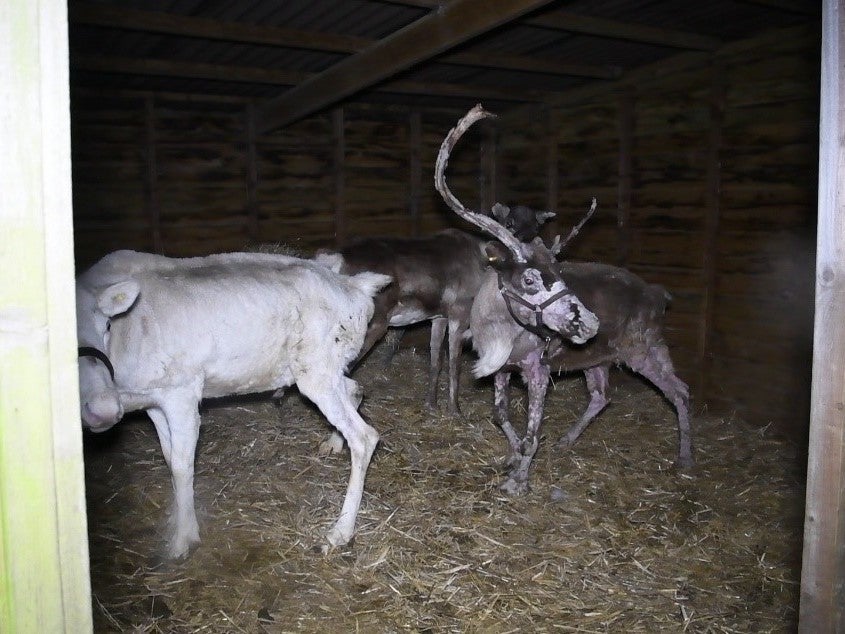Reindeer kicked, abused and underfed away from bright lights of Christmas events
Exclusive: ‘Some were thin to the point of emaciation ... the kicking is completely inexcusable,’ says vet
Your support helps us to tell the story
From reproductive rights to climate change to Big Tech, The Independent is on the ground when the story is developing. Whether it's investigating the financials of Elon Musk's pro-Trump PAC or producing our latest documentary, 'The A Word', which shines a light on the American women fighting for reproductive rights, we know how important it is to parse out the facts from the messaging.
At such a critical moment in US history, we need reporters on the ground. Your donation allows us to keep sending journalists to speak to both sides of the story.
The Independent is trusted by Americans across the entire political spectrum. And unlike many other quality news outlets, we choose not to lock Americans out of our reporting and analysis with paywalls. We believe quality journalism should be available to everyone, paid for by those who can afford it.
Your support makes all the difference.Reindeer were kicked, abused and suffered health problems at centres that supply animals for Christmas grottos and markets, according to undercover investigators who secretly filmed scenes that have been condemned by a vet as “inexcusable and disturbing”.
At centres around the country, footage was taken of workers kicking animals, and reindeer that appeared unwell, with diarrhoea or underweight, and others with raw, exposed skin.
Others were kept in “desolate, unnatural” conditions including bright lights and being frightened by visitors banging on fences.
Some were so malnourished that their ribs were showing, according to investigators. One of Britain’s leading deer specialists described the animals as “very thin to the point of emaciation”.

John Fletcher, founder and president of the Veterinary Deer Society, described the condition of some of the animals as “particularly disturbing”.
The violence, he said, was “completely inexcusable”.
Some of the animals were filmed panting – apparently unwell – or with almost all their fur lost through suspected stress or disease, the vet said.
The centres involved denied the animals were suffering and they insisted the creatures were kept in good conditions with veterinary care and naturally shed fur in spring.
The Animal Aid group began secretly filming at three reindeer centres last November, returning a number of times until last month.
Investigators said the worst offender was the Kent Reindeer Centre, where hidden cameras caught a worker twice kicking one of the creatures.
In one instance a man kicked and shouted at the animal to move it away from a gate. On the second occasion a worker was roughly pulling an animal into a pen by a head collar when he kicked the creature.
The Veterinary Deer Society considers England is not a suitable place to keep deer
On another occasion a gate was forcibly shut on a reindeer to keep it in the pen.
More swearing at the reindeer was heard in the background as they were being rounded up indoors.
“I found the sequences taken by hidden cameras of the ways in which the reindeer were being handled particularly disturbing,” Mr Fletcher said after viewing the footage. “The kicking of the animals as shown is completely inexcusable and shouting and swearing demonstrates a lack of comprehension and affinity with the reindeer which I found distressing.”
Both last year and again in May, reindeer at the Kent centre investigators said some of the creatures had their ribcages showing, suggesting they were underweight.
In the same month they said four of the creatures had “substantial fur loss and raw exposed skin”; others had wonky gaits, apparent lameness and sore backsides.
Mr Fletcher, the Royal College of Veterinary Surgeons’ only registered deer specialist, described those with ribs visible as “very thin to the point of emaciation” and said the dirty rumps were signs of diarrhoea.

Hearing swearing would be stressful for them because of the tenor of the worker’s voice and mammals could sense aggression, he said.
Just weeks ago, pens “appeared quite crowded” both during the daytime and at night when the sheds were shut.
Straw seemed to form a large part of their diet, investigators said. Mr Fletcher said this was unsuitable as feed and that hay would be better if lichen was not available.
At Blithbury Reindeer Lodge in Staffordshire, reindeer were seen with “extensive” fur loss, Animal Aid said. One had bowed legs and snapped antlers, they added.
At both Kent and Blithbury at least one animal had raw-looking skin, the investigators claimed. At Cheshire Reindeer Lodge activists said several animals’ ribs were visible, and feed buckets in the yard were empty. The yard itself was “barren”.
Mr Fletcher believed the raw skin patches were caused by biting or kicking when animals were bullied – a consequence of being kept confined rather than roaming, as in the wild.
The signs of ill health “reflect the fact that reindeer are not easy to keep in the relatively warm climate of the south of England in contrast to those in Scandinavia or the Scottish Highlands”, he said.
He added: “They are particularly susceptible to intestinal parasites, which can cause diarrhoea, and their digestion is delicate and vulnerable to sudden changes of diet.”
The only place in Britain where reindeer are suited to live is the Cairngorms, he said.
Animal Aid is so concerned about the welfare of the animals in the UK that it is writing to local authorities and garden centres to ask them not to use them at Christmas events such as Santa grottos, parades and lights switch-ons. The group says reindeer should not be used at events with bright lights, crowds and noise.
Mr Fletcher said: “Reindeer are domesticated animals not to be confused with their North American close relation the caribou, and as such they show great docility so that they are able to cope with public display remarkably well. Nevertheless some reindeer in this film are clearly not in good health – one appeared to have been bullied and lost hair. This can happen very quickly and requires good stockmanship to isolate such an animal from the deer that are picking on it.
“The Veterinary Deer Society considers England is not a suitable place to keep deer. When confined they don’t seem to thrive. There may be exceptions but I’m not aware of them.”
His comments echoed a 2014 report from the Animal and Plant Health Agency (APHA), which said: “Reindeer imported into countries such as the UK, which have very different environmental conditions to those for which these animals are adapted, need careful management if they are to thrive.”
It added that while in the UK they may be exposed to diseases and pathogens linked with other domestic livestock to which they have little natural immunity.
The agency said: “They should be provided with good quality hay and lush pastures should be avoided.” Sudden dietary changes can cause anorexia, it added.
Nine years ago, the then Veterinary Laboratories Agency (now APHA) found that reindeer were dying prematurely in England. Causes were thought to be unnatural diets, poor welfare and the stress of being out of their natural environments.
They shed their thick winter coat in chunks – this is totally natural
Tor Bailey of Animal Aid said: “They are sensitive wild animals, not props to be paraded around and used for human entertainment. At the Kent Reindeer Centre people were banging on the fencing, children were screaming, music was blaring – it was horrifying to see these gentle creatures being bombarded by things so stressful for them.
“There is nothing festive about the suffering the animals endure. I’d urge the public to find more animal-friendly ways to enjoy the festive period.”
Animal Aid, which also argues that pens restrict the instinctive behaviour of reindeer, reported its findings to trading standards and the RSPCA.
Stephen Swinnerton, of Blithbury Lodge, who is known as “the Reindeer Man” for his 30 years’ experience of the animals, insisted all his reindeer were happy and healthy, and none have ever chosen to jump their low fencing as they felt safe from predators, well fed and contented.
Referring to a reindeer seen with bowed legs, he said: “Instead of coming to me, someone has reported me to Trading Standards over my oldest, called Forest, who was 17 and had arthritis. Due to the complaints we had no choice but to have him euthanised, which caused me and my staff much distress.” Forest was on pain relief medication from a vet.
He said reindeer naturally lose their fur from March in clumps, and they snap antlers frequently. “They shed their thick winter coat in chunks and look very untidy. This is totally natural and every reindeer does this every year. They are often mistaken as having some ‘terrible skin condition’ but this is totally normal.
“Our reindeer are well fed with totally organic pasture, a specialist reindeer pellet diet with extra selenium, plenty of salt licks and are kept safe from predators,” Mr Swinnerton added.
Blithbury hires out only males for Christmas events, and then they are protected from lights and noisy crowds by stewards, fencing and their handlers, he said.
“We play Radio 2 on the farm all day so they know there are people around and they feel safe," he said.
The RSPCA came out and they were deemed to warrant no further action
A spokeswoman for Kent Reindeer Centre, near Ashford, said: “We take the welfare of all of our animals very seriously and they are all regularly inspected by our own vet, and any issues with regards to their health are dealt with immediately although some symptoms can be ongoing. The RSPCA came out and inspected the reindeer and [they were] deemed to warrant no further action.”
A Cheshire Reindeer Lodge spokesman said: “Our reindeer are extremely well kept, of correct weight and not housed solely on a yard. Any picture suggesting such would not be a true representation on how they are housed. Any yards are connected on to open paddocks and stables and the only times reindeer are held solely on a holding yard is for the switching of their grazing paddocks where they are held for worming, for their care, treatment or for their movement.”
A 2013 report by the Farm Animal Welfare Committee said: “We strongly suggest their welfare should be considered further by the government as they are particularly likely to be kept by inexperienced owners for commercial reasons.” However, the government has not specifically legislated.
A spokesman for the environment, farming and rural affairs department said: “Reindeer are protected by both the 2006 Animal Welfare Act and the 2018 Animal Welfare Regulations, meaning it is a criminal offence to cause them unnecessary suffering. Anyone found guilty of these crimes can be given an unlimited fine or sent to prison.
“The Animal and Plant Health Agency investigates all allegations of breaches to these strict rules and we urge anyone with concerns about the welfare of animals to report them.”

Join our commenting forum
Join thought-provoking conversations, follow other Independent readers and see their replies
Comments